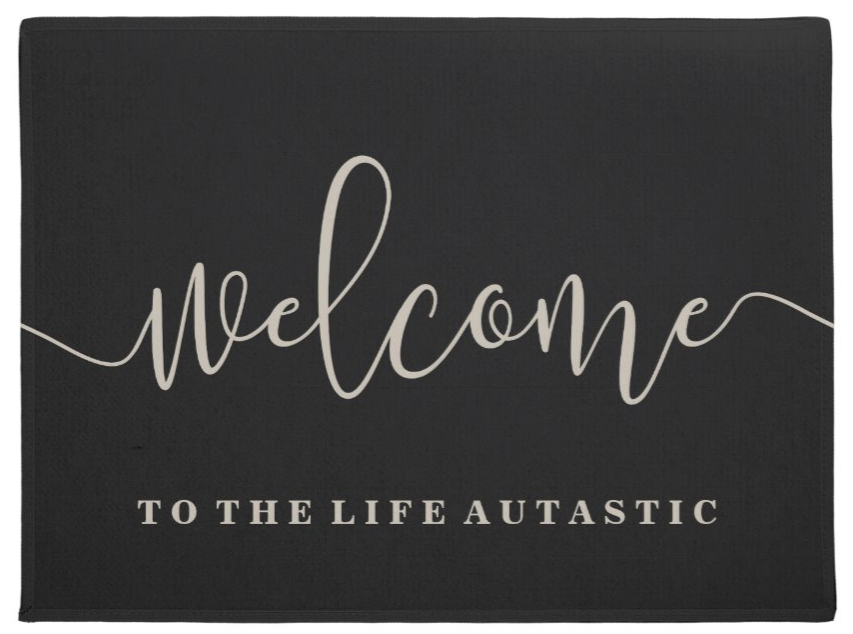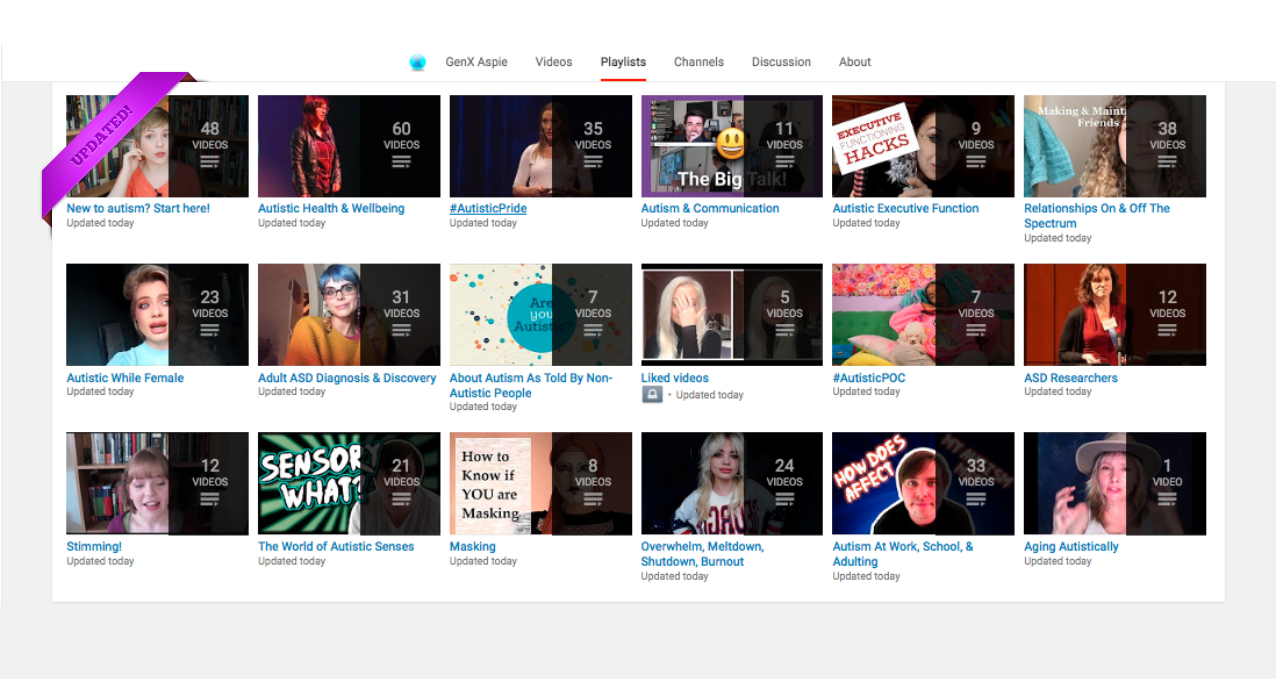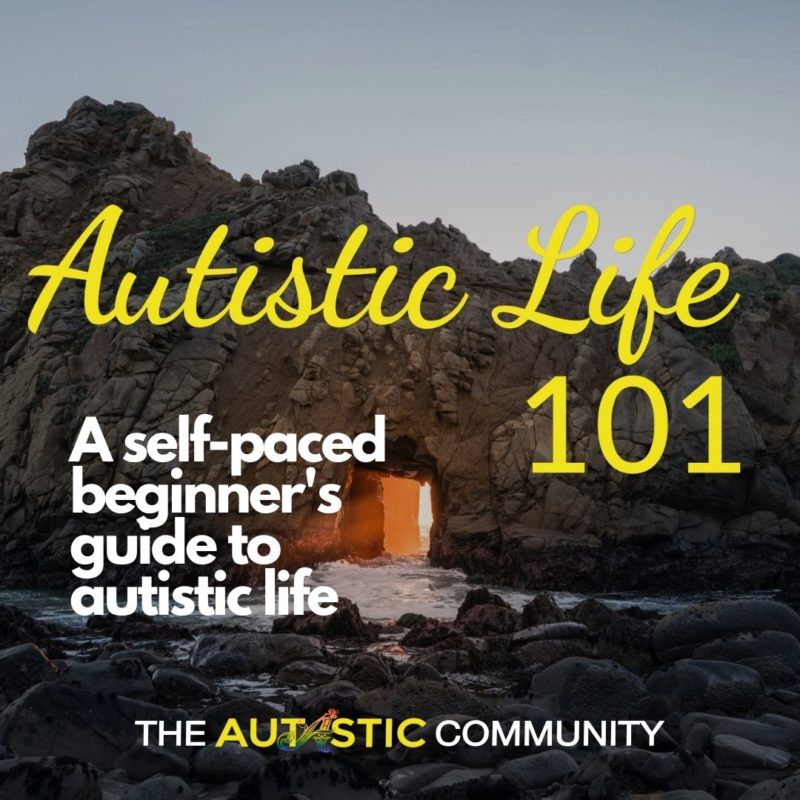Maybe you’re here because you just found out from an assessment service that you’re autistic. Or maybe you’re here because you saw a special on Channel 4 or a piece from The BBC, or someone sent you an article, or you completed a quiz on social media. Maybe your children have been screened for autism and you see yourself in them. Whatever your a-ha moment, however you got here, I’ve got the welcome mat out for you. See?👇🏽

You’re probably having some big emotions right now, amirite? Some people feel relief that there’s a word that describes their entire life up to this point because that means there are, and have always been, loads of people *just like you* out there. Some feel fear that they’ll be judged and treated negatively by a society that just doesn’t understand. You might be confused because YOU don’t understand, not yet anyway. That’s why you’re here. So let’s get you on your way to your new, more authentic, autastic life, shall we?
Where Do I Start?
There’s a lot to consider and a lot to know but first…
Pause. Relax. Breathe.
Here’s the thing. If you *are* autistic, you’ve always been autistic. Nothing about who you are will change with a confirmation or diagnosis. So there’s no rush. Really. You’ve always been you and you always will be. Take comfort in that. What *will* change, among other things, is how you see yourself and that, intrepid adventurer, will make life SO much better. Promise.
Learn The Basics
The first stop on many a journey is the American medical tome The Diagnostic and Statistical Manual of Mental Disorders (DSM–5 as of this writing). That’s the ever-evolving home base for diagnostic criteria and people go there because, at this point in 2020, autism is listed as a medical condition. The same goes for the International Statistical Classification of Diseases and Related Health Problems (ICD-11) outside of North America.
* Both of these were created and have evolved largely without the input or inclusion of historically marginalized communities, particularly communities of colour.
There are two important things to know before you go any further:
One ➼ Whether autism is a medical condition or not is a highly controversial topic not to be covered right here, right now. In a nutshell though, one camp says yes, autism is a medically defined developmental disorder that leaves people with lifelong deficits.
Two ➼ The other camp says that autism is a standard neurological variation in the population that’s as old as our species. This view is the foundation of the Neurodiversity Movement.
As you learn about yourself and the autistic community (which, if you’re here reading this, you’re very likely included) you’ll decide how you want to view yourself. For now, we’ll start with the basics.
Autism, Defined
What even is autism, anyway? The short version is that autism is the term for the collection of experiential differences that are common to a minority percentage of the population as observed by non-autistic people. Ok, maybe there isn’t a good “short version”. Want to know why? Put this on your reading list👇🏽
The history of how autism came to be observed and defined is fascinating and very relevant today. (Hint, adults, girls, non-binary people and people of colour were completely overlooked.) I highly recommend that your first stop by your research train be Steve Silberman’s “Neurotribes”.
It’s a page-turner you won’t regret.
This excellent piece by autistic advocate Mykola Bilokonsky is intended for media professionals but gives a great overview of autism from an autistic point of view. Think of it as a primer for anyone new to learning about autism: How To Talk About Autism Respectfully
To help with this convoluted definition problem (no, it’s not just you), I’ve taken the liberty to re-word the DSM-5 criteria so they’re more easily understood. My hope is that more people will see themselves described and investigate further. The more we understand ourselves, the better our lives will be so take a look at this👇🏽

Autism, Explained…Sort Of
One interpretation of the DSM-5 criteria for autism. Because accessibility.
But How Do I Know?
This is probably the only thing you can think about right now. You may want to find an assessment service and get evaluated pronto so you’ll know once and for all.
Except… Autism diagnosis is highly varied depending on where you live, who you are, and what kinds of services you have access to. Plus it can be confused with other conditions and relies upon a subjective evaluation. As of this writing, there are no standards that I know of for determining whether someone is autistic. There are regional procedures, yes, but as far as definitive quantitative testing? Not yet.
Here are some of the obstacles to getting what you want.
- The nature of autism is interpretive.
- The field is rapidly changing and assessors may not be up to speed.
- The field of autism research is rooted in a history that excludes adults, women and gender-expansive people, people of colour, and other historically excluded groups. That filters into the training programs and information provided to assessment professionals who, as a result, may not recognize autistic traits in a large percentage of the population.
- The nature of autism is that it is expressed differently from person to person depending on life circumstance, among other things.
What I’m saying is that it’s not as easy as walking in, getting blood drawn, and having a definitive conclusion pronounced. I’m sorry to be the bearer of that news but this is where we are.
So where does that leave you?
Choose Your Own Adventure
As I see it, you have three options:
Option #1: Do Nothing
You can continue to live your life as you have been. You’ve gotten along so far, right? Things could be better, sure, but you’re making it work. Or trying to. Or maybe it’s not working…
Sometimes people learn they are or might be autistic and leave it at that. They see no compelling reason to learn more about it and don’t believe taking things further will bring any significant change.
I urge you not to do that.
I unintentionally did that for a couple of years. When I first stumbled across autism as a concept that may apply to me, I knew nothing. Zero. So I thought, welp, there’s yet another term to define some facet of who I am similar to “HSP” (Highly Sensitive Person), Introvert, Indigo Child, etc. At the time, the concept didn’t mean much to me. I didn’t see myself in the diagnostic criteria and I figured knowing a new word to describe myself probably wouldn’t change my life.
I was so wrong. Don’t do that. Be curious.
Option #2: Seek Diagnosis
You can find a qualified assessment service and get yourself officially diagnosed. For some, this provides validation. It confirms that they aren’t making this up, that the struggles they’ve had are very real. They aren’t lazy, lacking discipline, disinterested, not trying hard enough, or a host of other imagined character flaws. For others, it allows access to much needed employment or educational support.
I’ve summarized some of the reasons people choose to seek diagnosis and some of the reasons they choose to forgo it here👇🏽

Is An Autism Diagnosis Right For You?
5 pros & cons of seeking an official diagnosis and how to get one.
Option #3: Adventure Ho!
Many people choose to venture into the journey to rediscover themselves on their own with community support. This can be the most rewarding way to go and I’ll tell you why.
When you undertake this epic course, you’re choosing to dive into a world that’s all about you. The depth and breadth of this sea is vast and you have all the time in the world to explore it. You will learn about yourself though the experiences of people who’ve lived lives eerily similar to your own. For many of us, that’s a foreign and mind-blowing idea.
You can’t predict where the journey will take you. With the other options, you’re likely to be limited to the information provided by your assessor or take in no new information at all. It often happens that you get your diagnostic report and not much else. That leaves you on your own and probably more distressed and confused.
But when you embark on your adventure into AutismLand, you’ll encounter countless roads to travel! Where you go and how far will be up to you. Will you learn about sensory differences today and stimming tomorrow? Or maybe you’ll learn how to turn your expertise into employment. You won’t know what you’ll find until you seek.
After finding connection, seeking diagnosis takes on new meaning: it can become validation rather than proclamation. And a shift like that can mean the world.
Perhaps the most compelling reason to learn through research and community engagement, is that when you see yourself mirrored in the lives of others, you begin to know, without any doubt, who you are. You will belong.
The Journey
I always suggest explorers start with autistic self-reporting. That means taking in the stories of autistic lives as told by autistic adults.
An easy way to start is with the “New to Autism? Start Here!” playlist I’ve assembled. Learn as vloggers like Neurowonderful’s Amythest Schaber explain the foundational concepts of autism. Then skip around the other playlists to get a feel for what the community has to offer, including our #AutisticBIPoC community members.

Autistic YouTube
Playlists about everything autism!
You might add some autistic podcasters to your housework or commute.

ASD-Friendly Podcasts!
A fine selection of podcasts for your autistic life. Listen up!
You might enjoy a good book or three. More and more autistic autobiographies are published every year. Find someone like you and fall into their story. And when you want more, our hand-picked reading recommendations await.

ASD Reading List!
Guides to living on the spectrum, autistic autobiographies, fiction by autistic authors, and more.
Start slowly. If one person’s story doesn’t resonate, try another. You’ll find one that does as autistic advocates across the globe speak up in increasing numbers every day. They’re doing it for you so go get your life.
When you’re ready, come find us. You’ll find loads of people ready to answer your questions, reassure your worry, and maybe even become a new friend. Here are a few places where you can show up and say hi.👇🏽

Find Your People
Find new #ActuallyAutistic friends out in the wilds of social media.
What If I Need More?
Everything you just read is likely plenty for anyone who’s recently learned their life isn’t exactly what they thought it’s been this entire time.

When the time comes that you’re ready to take the next step, consider our flagship course: #AutisticLife 101. In a nutshell, the course is a primer on the basics you’ll likely research and discover on your own eventually. This is a shortcut to save you those weeks and months.
It’s available to Autastic Community members exclusively so be sure the Community is a good fit for you.
Not only will re-finding yourself change how you feel about your life but learning who you truly are will set you up for a future that’s tailored — by you — for your happiness and wellbeing. Imagine for a second what that might be like. That feeling you got just now? That feeling, that can be your new autastic life.
Okay But What If I’m Not?
If it turns out that you’re not autistic, guess what? You’ll *still* be you. If you take your time to discover more about yourself, wherever you land on the spectrum — spectrum-adjacent or nowhere near — you’ll know more about yourself, be better able to navigate every day, and feel more real in your own skin than ever before.
Sure, you may flinch at loud noises — many people do. That doesn’t mean you’re autistic. You may be awkward at parties and feel you don’t fit in. Still doesn’t mean you’re autistic.
Autism diagnosis is made by observation, discussion, and examination of personal history. There is no serum test or measurement instrument to be hooked up to. Everyone has autistic traits. Absolutely everyone. Part of what makes us “on the spectrum” is the collection of traits we exhibit. It’s on your diagnostician’s shoulders to evaluate the entirety of your experiences and officially conclude whether or not you fit the autistic profile.
Some Parting Words…For Now
I want you to know that whoever you are and however you got here, I’m thrilled for you. Generations have lived and died never knowing why they struggled, didn’t fit in, or just were a little off-center. They didn’t have a chance to change things for the better. But you do.
You have an extraordinary opportunity. By wanting to know more and reading this far, you’ve already taken TWO positive, concrete steps towards a better future. That’s worth celebrating.
How you feel about yourself is in your hands. Learn what you can, in any way you choose, and re-build your life. Will it be easy? No, no it won’t. But countless thousands of us do it every day and have for all of time. You’ve got this.


